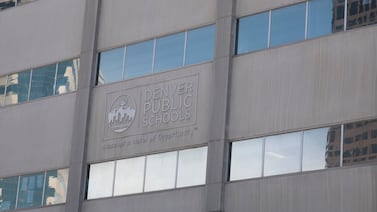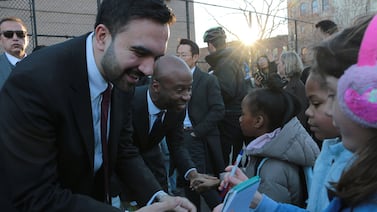Sign up for Chalkbeat Chicago’s free daily newsletter to keep up with the latest news on Chicago Public Schools.
The Illinois State Board of Education is proposing an additional $497.2 million for the state’s education budget — a smaller increase than last year as federal COVID relief money dries up and the state grapples with a projected deficit.
If approved by the state’s general assembly, the education budget would grow from $11 billion to $11.4 billion in fiscal year 2026, which starts July 1 and ends June 30, 2026.
The board unanimously approved Illinois Superintendent Tony Sanders’ budget proposal at a Wednesday board meeting without any pushback from members.
Sanders proposed an additional $350 million for the state’s evidence-based funding formula for K-12 schools, which distributes new state education funding to schools based on need, sending more to under-resourced schools and those that serve a majority of students from low-income households, English learners, and students with disabilities.
ISBE’s budget recommendation also includes an additional $75 million for the board’s early childhood education block grant. The state approved an additional $75 million for the grant in 2023 and 2024 as a part of the governor’s initiative to increase funding to early childhood education.
The modest education budget proposal — which will now head to Gov. J.B. Pritzker as he develops a full state budget — grapples with the end of $7 billion in federal emergency COVID relief funds for schools that expired at the end of September. Overall, Illinois is projecting an $3.2 billion budget deficit in fiscal year 2026.
Still, education advocates are disappointed, but not surprised that the recommendation for the evidence-based funding formula for K-12 schools is less than the $550 million advocates called for during the budget hearings in the fall.
A report from the Center for Tax and Budget Accountability last spring found that Illinois schools will remain underfunded past 2027, the year lawmakers anticipated schools would all be adequately funded when they passed the new formula in 2017. If the state continues to increase education funding by only $350 million a year, schools would be fully funded by 2034, the report said. The state could speed that up if lawmakers allocated $550 million to the state’s education budget each year.
Claiborne Wade, chair of Kids First Chicago’s Equitable Funding Task Force, a CPS parent, and staff member at DePriest Elementary, is not surprised that the board decided to propose $350 million. However, he hopes the state will boost funding to K-12 schools by $550 million due to the uptick in inflation and the end of COVID-19 relief funds for schools.
“COVID dollars was, I believe, one of the main purposes of some schools and community-based organizations to be able to function without having to worry about where the next dollar was going to come from,” Wade said. “Now that it has run out, it’s ‘How do we sustain these programs that’s been in effect for the past couple years?’ It’s going to be tough.”
This year, the state board did not recommend funding a Supporting Newcomers grant, which would support students who recently immigrated to the United States. Last year, the board requested $35 million, but it was not approved for the final budget.
As the state and local school districts put together their budget for next school year, they will have to make decisions with less funding.
In Sanders’ proposal, career and technical education programming would receive an additional $1.3 million, increasing the budget line from $58 million to $59.3 million. But some advocates spoke Wednesday about the need for more.
Matthew Sell, a former Illinois student who took courses at the Galesburg Area Vocational Center and currently works in advanced manufacturing, asked for additional funding for the center in Western Illinois to support workforce development.
“I think that increased funding would not only be an investment for the students in this area, but as well as the community as a whole.” said Sell.
The education budget proposal will now be incorporated into Pritzker’s overall budget plan, which he is scheduled to present Feb. 19 at the state capitol in Springfield.
State lawmakers can make changes to Pritzker’s proposal and must pass a budget by the end of the spring legislative session, which is currently scheduled to wrap up May 31. In previous years, the legislature has extended the spring session to pass the budget.
Samantha Smylie is the state education reporter for Chalkbeat Chicago covering school districts across the state, legislation, special education and the state board of education. Contact Samantha at ssmylie@chalkbeat.org.






